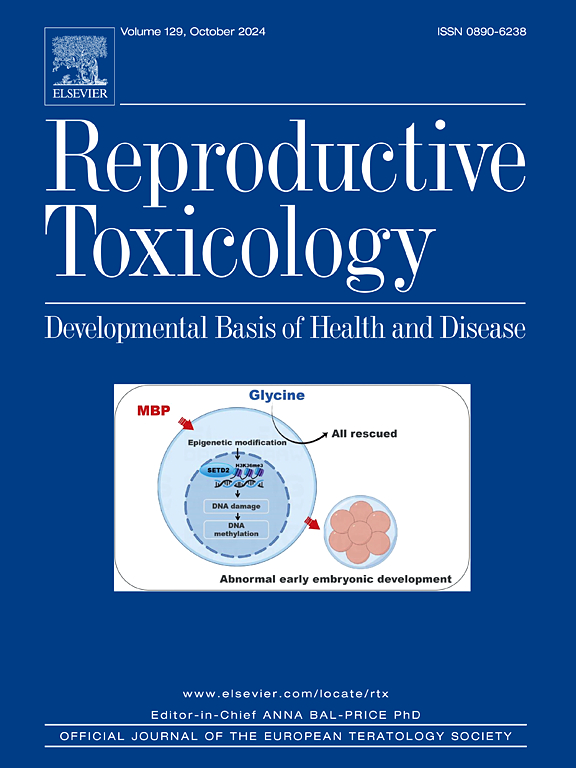孟德尔随机分析揭示自身免疫性疾病与女性不孕症风险之间的因果关系。
IF 2.8
4区 医学
Q2 REPRODUCTIVE BIOLOGY
引用次数: 0
摘要
背景:不孕症在全球范围内被视为一个重大的社会挑战。许多观察性研究已经证明了自身免疫性疾病(ADs)与女性不孕症之间的联系,但根本原因尚不清楚。本研究的主要目的是确定ad与女性不育之间的因果关系。方法:我们评估了流行自身免疫性疾病(系统性红斑狼疮(SLE)、类风湿性关节炎(RA)、1型糖尿病(T1DM)、乳糜泻(CeD)、炎症性肠病(IBD)、强直性脊柱炎(AS)、克罗恩病(CD)、溃疡性结肠炎(UC)、牛皮癣和女性不育症)的全基因组关联研究(GWAS)的汇总统计数据。最初的两样本孟德尔随机化(MR)分析在发现和复制分析中查明与女性不孕症相关的自身免疫性疾病。结果:我们的双样本孟德尔随机化分析,使用来自UK Biobank和FinnGen(或IIBDGC)的数据,为遗传预测的类风湿性关节炎(RA)、1型糖尿病(T1DM)、乳糜泻(CeD)和溃疡性结肠炎(UC)与女性不孕风险增加之间的因果关系提供了证据。这些关联是在不同的不育亚表型中观察到的。结论:这项基于大规模GWAS数据集的孟德尔随机化研究提供了遗传证据,支持几种自身免疫性疾病与女性不孕风险增加之间的因果关系。这些发现强调了免疫介导机制在生殖功能障碍中的潜在作用,并可能为未来研究受影响个体的早期干预和生育保护策略提供信息。本文章由计算机程序翻译,如有差异,请以英文原文为准。
Mendelian randomization analysis reveals causal associations between autoimmune diseases and female infertility risk
Background
Infertility is viewed as a significant social challenge globally. Numerous observational studies have documented the link between autoimmune diseases (ADs) and female infertility, yet the underlying cause remained unclear. The primary objective of this study was to ascertain the causal connection between ADs and female infertility.
Method
We evaluated summary statistics from genome-wide association studies (GWAS) for prevalent autoimmune diseases (systemic lupus erythematosus (SLE), rheumatoid arthritis (RA), type 1 diabetes (T1DM), celiac disease (CeD), inflammatory bowel disease (IBD), ankylosing spondylitis (AS), Crohn's disease (CD), ulcerative colitis (UC), psoriasis and female infertility. Initial two-sample Mendelian randomization (MR) analyses was conducted to pinpoint causal autoimmune diseases associated with female infertility in the discovery and replication analysis.
Results
Our two-sample Mendelian randomization analysis, using data from the UK Biobank and FinnGen (or IIBDGC), provided evidence for a causal association between genetically predicted rheumatoid arthritis (RA), type 1 diabetes (T1DM), celiac disease (CeD), and ulcerative colitis (UC) and an increased risk of female infertility. These associations were observed across different sub-phenotypes of infertility.
Conclusions
This Mendelian randomization study, based on large-scale GWAS datasets, provides genetic evidence supporting a causal association between several autoimmune diseases and increased female infertility risk. These findings highlight the potential role of immune-mediated mechanisms in reproductive dysfunction and may inform future research into early interventions and fertility-preserving strategies in affected individuals.
求助全文
通过发布文献求助,成功后即可免费获取论文全文。
去求助
来源期刊

Reproductive toxicology
生物-毒理学
CiteScore
6.50
自引率
3.00%
发文量
131
审稿时长
45 days
期刊介绍:
Drawing from a large number of disciplines, Reproductive Toxicology publishes timely, original research on the influence of chemical and physical agents on reproduction. Written by and for obstetricians, pediatricians, embryologists, teratologists, geneticists, toxicologists, andrologists, and others interested in detecting potential reproductive hazards, the journal is a forum for communication among researchers and practitioners. Articles focus on the application of in vitro, animal and clinical research to the practice of clinical medicine.
All aspects of reproduction are within the scope of Reproductive Toxicology, including the formation and maturation of male and female gametes, sexual function, the events surrounding the fusion of gametes and the development of the fertilized ovum, nourishment and transport of the conceptus within the genital tract, implantation, embryogenesis, intrauterine growth, placentation and placental function, parturition, lactation and neonatal survival. Adverse reproductive effects in males will be considered as significant as adverse effects occurring in females. To provide a balanced presentation of approaches, equal emphasis will be given to clinical and animal or in vitro work. Typical end points that will be studied by contributors include infertility, sexual dysfunction, spontaneous abortion, malformations, abnormal histogenesis, stillbirth, intrauterine growth retardation, prematurity, behavioral abnormalities, and perinatal mortality.
 求助内容:
求助内容: 应助结果提醒方式:
应助结果提醒方式:


